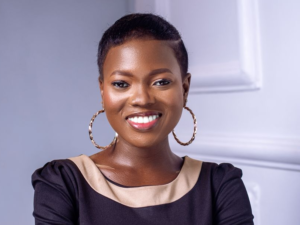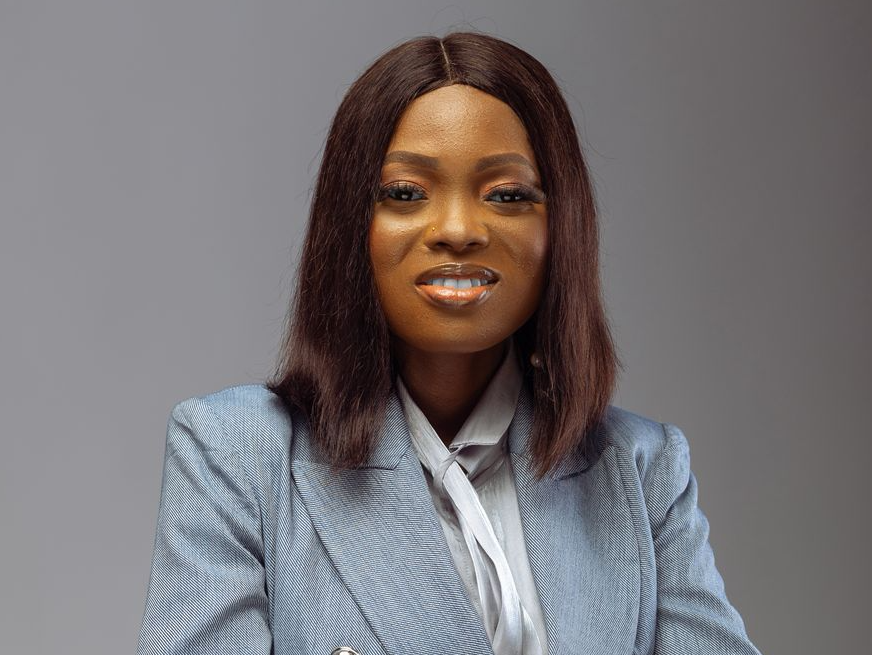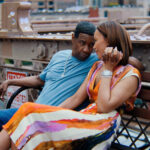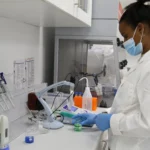Growing up between worlds, Rebecca Olatunji transformed her family’s story into a national fight for disability inclusion.
What does it look like for a hearing child to be born into a family where both parents live with hearing impairment?
It means her first language would not be English, Yoruba, Hausa or Igbo but sign language. For a child born into a middle-class family, it also means a life tainted with a weird mix of love and stigma.
Ayodele Rebecca Olatunji remembers those moments vividly. Walking with her parents in public, she would see strangers press money into her hands with a sympathetic smile. “They can call us and just say, take this 10 naira 20 naira when obviously we are not even begging.”
Amidst the side comments from passengers, bus conductors short-changed her father since he could not hear the correct fare.
“It dropped my self-esteem badly,” she admits. “So as a person, I just decided one time that I’d rather just sit at home than go out with them.”
“Why are you ashamed of us?” Rebecca’s younger sister, who had also lost her hearing, asked her one day. The question had hit Rebecca like a splash of cold water.
She continued interpreting movies for her sister, boldly signing in public instead of hiding, and answering curious questions from strangers with pride instead of shame. This became the foundation of her lifelong commitment to disability inclusion.
Years afterwards, Rebecca created the Champions of Deaf Awareness and Humanity Initiative, which leverages advocacy and sign language tutorials to ease the hurdles for the hearing-impaired.
CODAH’s impact is visible across thousands of beneficiaries—including a growing list of awards for disability inclusion.
A mission rooted in experience
Nigeria is home to more than 8.5 million people with hearing loss. Without access to education, healthcare, or employment, many Nigerians with hearing loss face systemic exclusion.
In a society that too often equates hearing loss with helplessness, stigma becomes a heavier burden than the disability itself.
Rebecca’s story defies that narrative, as she would later rise to be the face of disability inclusion.
During her gap year, she volunteered as a teacher in a community school for two years. In 2011, she got admission into the Yaba College of Technology for a diploma in Polymer and Textile Technology, a chemistry-based course focused on plastics and textile production.

To help cover her expenses as an undergraduate, Rebecca worked as a private tutor. She would continue teaching even after her diploma.
In 2021, she enrolled for further studies at the University of the People, an online institution. Around the same time, she obtained a postgraduate diploma in Special Needs Education from the University of Lagos.
Today, she is pursuing a degree in Social Work at the University of Ibadan, merging her lived experience with professional grounding in community service and development. Each stage of her education fed into her vision, which would later crystallise into a mission for disability inclusion.
Building CODAH
Rebecca never set out to start an NGO. “I just wanted to make an impact,” she says. As a young secondary-school girl committed to Christ, she had been raised on the instruction that life was not her own but should be given back to others.
Her early years as a classroom teacher further deepened that belief. But a stint in a community programme where she taught sign language became her turning point. Walking back home from those sessions, she felt that she had found her cause.
“I realised sign language was a skill I had, one that wasn’t common,” she recalls. “And if I could spread it, then maybe the world could be more inclusive for deaf persons.”
It wasn’t smooth sailing, though. Many schools dismissed her sign-language programme as unnecessary. When a school finally acceded to her proposal, she began sharing her class sessions on social media. Before long, other schools plied her with invitations.
In 2019, Rebecca applied for a $150 grant and, to her surprise, won second place. With the funds, she launched her first structured parent-training programme at a deaf school to bridge the gap between parents and children, enabling them to meet both the psychological and physical needs of their children.
The initial session comprised 25 parents, learning the basics of sign language to help them communicate better with their children. The success of the programme inspired her to host more sessions, with more participants, thanks to another grant.
The “I Can Sign” School Project, a flagship programme, took off with a mission to expand the knowledge of sign language among mainstream students across Nigeria so hearing students could interact with their classmates with hearing loss.
Each week, pupils are trained in basic vocabulary and conversational skills. Within weeks, those children became interpreters for their peers—an addition to the fight for disability inclusion.
In response to increasing demand, Rebecca introduced structured six-week and twelve-week curriculums. Her entry sessions were free, but continued tuition came at a subsidised charge in order to help her pay her staff.
Rebecca’s attempts to formally register her initiative were met with Nigeria’s notorious bureaucracy. The Corporate Affairs Commission continually rejected her preferred name. “They told me to just change it to Rebecca Foundation,” she recalls, “but I said no. CODAH was going to remain.”
After five failed attempts, she finally succeeded in 2025, though the name was tweaked to what it is today: Champions of the Deaf and Awareness Initiative (CODAH).
From awareness to disability inclusion advocacy
Amidst these struggles, she expanded into advocacy, leading rallies, social media campaigns, and community events to mark “Deaf Awareness Month” every September.
It also convened “Diversity, Equity, Inclusion & Disability Dialogues,” bringing educators, employers, and policy actors into the same room with Nigerians with hearing loss.
Her continuing campaigns transformed Rebecca from a sign-language teacher to an advocate for disability inclusion. She received local awards and speaking invitations, as well as small grants from organisations like GIZ, a Nigerian-German centre for Migration and Development.
Next came the “Family Project,” where Rebecca shifted focus to parents. She noticed many children with hearing loss were isolated at home, unable to chat with siblings, joke with cousins, or confide in parents.
Training families became a life-changing intervention. Parents were provided with six-week sign language courses, enabling full conversations at home. Some extended the training to relatives, widening the spectrum of communication on disability.
To expand reach with her message about disability inclusion, Rebecca launched the “Fellow Project,” a strategy to train volunteers as sign language ambassadors. These fellows replicated the model in other schools, multiplying CODAH’s impact without stretching her thin. By the end of 2021, CODAH had touched hundreds of students and parents across Lagos and Ogun states.
Campaigning for disability inclusion was not enough. Nigerians with hearing loss also needed economic empowerment. So in 2023, she began “Digit PW,” a digital literacy project supported by GIZ to take the message of disability inclusion further.
The programme equipped deaf and disabled persons with skills in graphic design, social media management, and digital marketing. Participants received laptops, mentorship, and internship opportunities. At least 15 graduates of Digit PWD are employed or running freelance businesses online today.
By late 2023, CODAH had reached more than 10,000 direct beneficiaries through school programmes, family projects, and fellows. Its social media campaigns reached far wider, amplifying issues on disability to an estimated 100,000 Nigerians and showing why disability inclusion is an urgent issue.
CODAH, originally an acronym for “Collaboration of the Deaf and Hearing,” had already gained recognition online. She could not abandon the identity.
Now legally recognised, the organisation operates with a clear structure: while Deaf learners are trained for free, there are also free introductory sign language classes for communities, subsidised advanced courses for individuals (₦15,000–₦50,000), and school subscriptions that fund trainers’ stipends.
This year, CODAH rolled out the “Hands & Voices Project,” targeting children aged 3 months to 5 years. The programme aims to produce child-friendly learning materials—flashcards, toys, and books—that introduce basic sign language to toddlers. The goal? Ensuring that children born with hearing loss, or into such families, begin life with communication tools instead of silence
Her next big dream is a dedicated Deaf Inclusion Centre, a one-stop hub for early childhood intervention, sign-language training, and continuous family support. The urgency of this project is underscored by UNESCO’s estimate of 40% of Deaf people worldwide having no access to education in a language they understand.
The question that once defined Rebecca’s life—”What does it look like for a hearing child to grow up in a Deaf world?” – has now become a broader challenge for Nigeria. What does it look like to build a country where sign language becomes a bridge towards disability inclusion? Rebecca’s work to spread disability inclusion makes her an inspiring Prime Woman.
Summary not available at this time.






